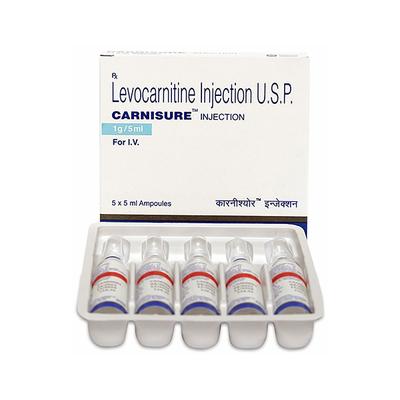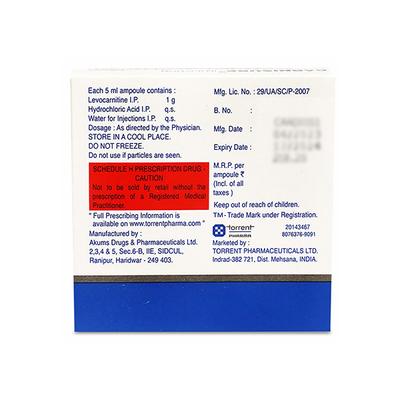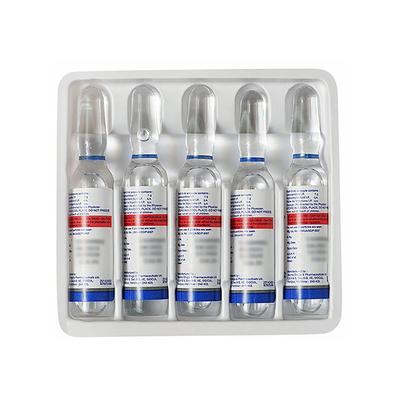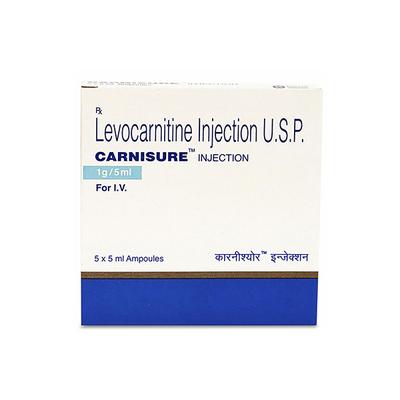

Netmeds First Membership
Quick Links
Introduction About CARNISURE 1GM INJECTION
CARNISURE 1GM INJECTION contains Levocarnitine, which belongs to the group of medicines called amino acid derivatives. It is used to manage levocarnitine deficiency. Levocarnitine deficiency can occur as a result of a congenital deficiency, various metabolic disorders, end-stage kidney disease and haemodialysis management.
The symptoms of levocarnitine deficiency may include muscle weakness (muscles of the hips, shoulders, neck, jaw, and even heart muscles), fatigue, low blood sugar, stomach pain, growth retardation, brain function defects, etc.
Before recommending CARNISURE 1GM INJECTION, your doctor may want you to take blood tests to check for the existing amount of levocarnitine in circulation to determine the correct dosage for you. CARNISURE 1GM INJECTION is not recommended for use in patients suffering from a history of fits or severely compromised renal function.
Pregnant or breastfeeding women should use CARNISURE 1GM INJECTION with caution; therefore, consult your doctor before taking. The most common side effects of taking CARNISURE 1GM INJECTION are vomiting, nausea, stomach pain, diarrhea, headache, and an abnormal fish-like body odour (fish-like smell). Contact your doctor if any of the symptoms worsen.
Uses Of CARNISURE 1GM INJECTION
CARNISURE 1GM INJECTION is used to manage:
- primary systemic carnitine deficiency by birth
- secondary carnitine deficiency due to certain metabolic disorders that result in the accumulation of abnormal and toxic metabolites (Ex. methyl malonic aciduria, propionic acidemia, glutaric aciduria and medium chain fatty acetyl dehydrogenase deficiency
- secondary carnitine deficiency due to hemodialysis
How CARNISURE 1GM INJECTION Works
Levocarnitine is a naturally occurring substance in the body that is essential for the energy metabolism of the body. It is utilized in the process of producing energy in the energy-building bodies of our cells (mitochondria). This helps in sustaining the muscular activity of the heart and other muscles.
How to use CARNISURE 1GM INJECTION
CARNISURE 1GM INJECTION is administered only by a doctor or nurse directly into the veins (intravenously). Your doctor will decide the correct dose and duration for you depending on your age, body weight and disease conditions.
Side Effects Of CARNISURE 1GM INJECTION
Common
- vomiting
- nausea
- upset stomach
- diarrhea
- stomach pain
- abnormal taste
- body odour (fish-like smell)
- headache
Rare
Stop taking CARNISURE 1GM INJECTION and consult your doctor immediately if you experience any of the following:
- signs of allergic reaction such as difficulty swallowing or breathing, hives, swelling of the face, lips, tongue or throat, rash
- unexplainable muscle pain, muscle tenderness or weakness, dark brown urine (Rhabdomyolysis)
- signs of increased levels of calcium such as increased thirst, frequent urination, nausea, vomiting, constipation, pain in bones, confusion and fatigue
- signs of high blood pressure such as headache, dizziness, vision problems, shortness of breath
- palpitations
- signs of decreased blood platelet count such as bleeding or bruising, fatigue and weakness
- signs of anemia such as fatigue, loss of energy, weakness, shortness of breath
- signs of bronchitis such as coughing and difficulty breathing
- low blood sugar
- fits (seizures)
- signs of dermatitis exfoliative such as rashes, redness, widespread blistering or peeling of the skin and mucosa (mouth)
How To Manage Side Effects
Nausea and vomiting:
Stick to simple meals. Avoid eating rich or spicy food. Consult your doctor if it persists for a long or worsens with time.
Difficulty in breathing (Dyspnea):
Take slow deep breaths. Perform breathing exercises. Try to seek medical help immediately if it persists or worsens with time.
Headache:
Stay hydrated and take rest as much as possible. Stay away from harsh lights and loud sounds. Apply a pain-relieving balm on the forehead. Consult your doctor if it persists for a long or worsens with time.
Tiredness:
Drink plenty of fluids and electrolytes and eat a balanced diet with an increased frequency of meals. Try to do regular minimal exercise and follow a proper sleep schedule. If the symptom does not improve consult your doctor for the same.
Warning & Precautions
Pregnancy
CARNISURE 1GM INJECTION must be used with caution in pregnant and those who are planning to get pregnant women due to a lack of safety data. Consult your doctor before receiving CARNISURE 1GM INJECTION.
Breastfeeding
CARNISURE 1GM INJECTION must be used with caution in nursing women due to a lack of safety data. Consult your doctor before receiving CARNISURE 1GM INJECTION.
Driving and Using Machines
CARNISURE 1GM INJECTION is considered safe for driving or while using machinery. However, consult your doctor before receiving it.
Kidney
CARNISURE 1GM INJECTION administration is not recommended in patients with severely compromised renal function as it may lead to toxic metabolites accumulating in the kidney. This medicine must be used cautiously in patients suffering from kidney disorders and undergoing hemodialysis. Consult your doctor before receiving CARNISURE 1GM INJECTION.
Allergy
Do not administer CARNISURE 1GM INJECTION if you are allergic to Levocarnitine.
Others
CARNISURE 1GM INJECTION is not recommended for use if you:
- have a history of fits (seizure activity) as it may lead to a rise in the frequency, duration and severity of the seizures
Before taking CARNISURE 1GM INJECTION, inform your doctor if you:
- have diabetes
Use in Pediatrics:
CARNISURE 1GM INJECTION must be used with caution in pediatric patients and should be administered with the medicine based on their age, body weight and disease condition. Consult your doctor before receiving it.
Interactions
A. Drug-Drug Interactions:
Before taking CARNISURE 1GM INJECTION, inform your doctor if you are taking any of the following medicine:
- medicines used to manage blood clots (Ex. warfarin, heparin, aspirin, clopidogrel)
- medicines to manage elevated blood sugar levels (Ex. insulin, metformin etc.)
Overdosage:
CARNISURE 1GM INJECTION will be administered to you only by a doctor or a nurse in a hospital, so you’re unlikely to receive an overdose. However, consult your doctor or nurse if you experience any unusual symptoms after receiving CARNISURE 1GM INJECTION.
Synopsis
| Drug | : | Levocarnitine |
| Pharmacological Category | : | Amino acid derivatives |
| Therapeutic Indication | : | Carnitine deficiency |
| Dosage Forms | : | Tablet, Capsule, Syrup, Injection |
More Information
- Keep CARNISURE 1GM INJECTION out of reach from children
- Store at a controlled room temperature of 25°C
FAQs About CARNISURE 1GM INJECTION
Can I administer CARNISURE 1GM INJECTION myself at home?
No, CARNISURE 1GM INJECTION should only be administered by a registered doctor or nurse, as it is given directly into the veins (intravenously). Consult your doctor before taking it.
What is CARNISURE 1GM INJECTION used for?
CARNISURE 1GM INJECTION is used to manage carnitine deficiency, which can occur at birth, as a result of certain metabolic disorders, or as a result of a medical procedure such as hemodialysis. This reduced level of levocarnitine results in decreased energy, leading to muscle weakness. CARNISURE 1GM INJECTION helps manage these symptoms by managing the deficiency.
How should CARNISURE 1GM INJECTION be stored?
CARNISURE 1GM INJECTION should be stored at a controlled room temperature of 250 C. It is recommended not to store it in the refrigerator. Also, CARNISURE 1GM INJECTION should be kept out of reach of children.
What medications should I not take before or after receiving CARNISURE 1GM INJECTION?
Anti-diabetic medications (Ex. Insulin, Metformin), blood-thinning medications (Ex. Aspirin), and medications to manage blood clots (Ex. Heparin, Warfarin) are not recommended to be taken along with CARNISURE 1GM INJECTION as they may lead to unwanted side-effects. Inform your doctor about all the medicinal and/or surgical managements that you were, are, or will be undergoing before receiving CARNISURE 1GM INJECTION.
Can I drive my way back home after receiving CARNISURE 1GM INJECTION?
Yes, you can drive after receiving CARNISURE 1GM INJECTION since CARNISURE 1GM INJECTION has not been reported to cause disturbance while driving or using machinery. However, consult your doctor before receiving CARNISURE 1GM INJECTION.
Is it normal to experience body odour after receiving CARNISURE 1GM INJECTION?
Yes, body odour is a common side effect usually seen after receiving CARNISURE 1GM INJECTION. Apply a mild deodorant or perfume to the skin to manage it. However, it should be brought to the attention of your doctor if it worsens with time.
Can I receive CARNISURE 1GM INJECTION if I am pregnant?
It is recommended to consult your doctor and bring it to his attention if you are pregnant or are planning pregnancy before receiving CARNISURE 1GM INJECTION, as its effects have not been studied in pregnant women.
References
1. KD Tripathi. Miscellaneous drugs. Vitamins. Essentials of Medical Pharmacology. Seventh edition. 2013. Page 912.
2. Pistone, G., Marino, A.D., Leotta, C., Dell’Arte, S., Finocchiaro, G. and Malaguarnera, M., 2003. Levocarnitine administration in elderly subjects with rapid muscle fatigue. Drugs & Aging. [Revised in 31st August 2012] [Accessed on 15th July 2022] https://link.springer.com/article/10.2165/00002512-200320100-00004
3. Leadiant Biosciences. U.S Food and Drug Administration. [Revised in April 2018] [Accessed on 15th July 2022] https://www.accessdata.fda.gov/drugsatfda_docs/label/2018/020182s015lbl.pdf
4. Sigma-tau Industrie Farmaceutiche Riunite S.p.A. Electronic Medicines Compendium (EMC) [Revised in May 2017] [Accessed on 15th July 2022] https://www.medicines.org.uk/emc/files/pil.6471.pdf
5. Leadiant Biosciences, Inc. Levocarnitine. [Revised in November 2017] [Accessed on 15th July 2022] https://pdf.hres.ca/dpd_pm/00041980.PDF
Useful Diagnostic Tests
- Carnitine test–Blood test











